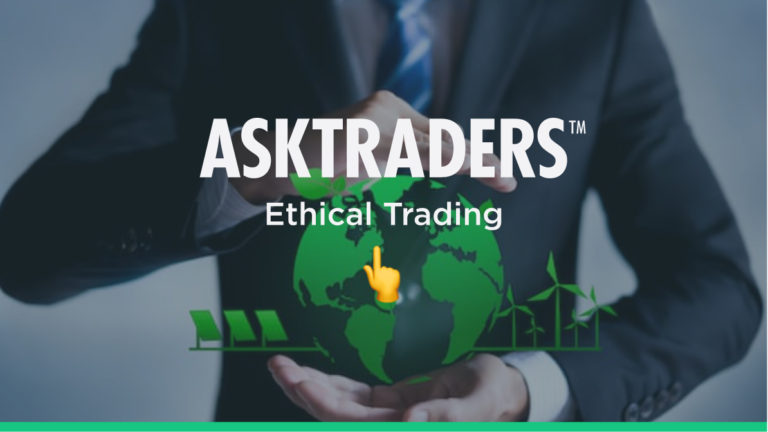
A growing number of traders are taking a much closer look at what their money actually does, when they invest in a new company or fund. They care about more than return on investment, and financial statements. They want to know that their money is helping to make the world a better place, and they’re determined to ensure that their trading activities are ethical, as well as profitable.
Ethical trading, also known as ethical investing, or socially responsible investing, simply involves choosing to invest only in companies that are operating in an ethical and responsible way. It’s a popular investing trend, which has led to socially responsible mutual funds and index funds, as well as individual investors who tend to include how an organisation is operating, alongside other factors, when deciding to invest. Ethical traders care about more than the price of stocks in a particular entity. They also care about what good it is doing in the world, and the impact it is having on future generations.
Here at AskTraders, we’ve put together ‘The Ultimate Guide to Ethical Trading.’ Over a series of articles, we’ll be taking a look at everything you need to know about ethical trading in 2025 and beyond. Below you will find links to articles and information to help you get started with ethical investing.
What is corporate social responsibility and why does it matter?
There is no hard and fast rule of what constitutes socially responsible business activity. There are however voluntary standards in place for companies to work towards. Therefore, there will always be a subjective element to ethical trading. However, many ethical traders choose to avoid firms that profit from tobacco, alcohol, pornography, gambling, weapons, fossil fuels, or nuclear power. They may specifically choose to invest in companies producing green energy, or other environmentally sustainable products. Others may choose to look at how a company sources its materials, how it treats its workers, and what its carbon footprint is. As a trader, you can find out where an organisation stands by doing some research and finding the corporate social responsibility policy for the company you would be interested in investing in.
No easy answers: the problem with socially conscious trading
It will not surprise any trader to learn that when it comes to ethical trading, there are no easy answers. It is often impossible to draw hard lines and determine if an organisation is socially responsible or not. There are many companies that meet or exceed some of the criteria that would indicate their social responsibility while simultaneously failing other criteria. One thing you must do, as an ethical trader then, is to assess your own values. You need to prioritise what is important to you, and know which business activities and social issues you want to support. In this section, we’ll take a closer look at some of the aspects to consider, and examine why it is often hard to find investments that you consider truly ethical, at every level.
What are sustainable ETFs?
If you are already trading Exchange Traded Funds (ETFs) you will be aware that these funds hold a variety of assets such as stocks, bonds or commodities. Unsurprisingly, given that ethical trading is becoming a popular trend in asset management, there are now sustainable ETFs aimed specifically at attracting the money of ethical traders. Sustainable ETFs are also sometimes referred to as ESG ETFs, with the ESG referring to entities that adhere to environmental, social and governance investing principles.
The best socially responsible companies to invest in
Ethical trading is subjective, each trader will have their own ideas about which industries and business practices they want to support. However, we want to simplify things by taking a look at some of the best socially responsible companies available and explaining why these are such good investments for the ethical trader. We will dive deep in this section and examine some of the companies taking social responsibility seriously.

The best sustainable ETFs to have in your portfolio
As with individual companies, choosing the best sustainable ETF is not easy. One of the difficulties involved in sustainable investing is the fact that few organisations meet every criteria for social responsibility. This is only complicated further when looking for a truly ethical ETF, given that each fund will hold a variety of assets. We help you assess the best sustainable ETFs out there. We will also cover the basics of ESG screening, where you learn to look at a range of indicators to assess an organisation’s values when it comes to environmental and social responsibility, and governance.
Ethical stocks: environmentally friendly stocks
If ethical investing is partially about deciding which issues matter to you, many potential ethical traders will prioritise the environment. If that is you, you will want to identify environmentally friendly stocks to invest in. Even then, there are different issues to be examined. Environmentally friendly companies include those that are investing in green energy and electric vehicles, those who use recycled or environmentally sustainable raw materials, those who go to great lengths to keep their carbon footprint small, and so on. There are plenty of environmentally friendly stocks to choose from, and we aim to help you make that choice.
Ethical stocks: equality
Another ethical issue when it comes to investing is equality. Many ethical traders choose to examine the equal opportunity policies and records of the companies they invest in. Various funds and asset management companies are now taking note of this, too. There are now opportunities to invest in ETFs that track companies based on gender equality within the organisation to ensure investors are not supporting misogynist practices in the workplace. You may also want to invest only in companies that actively provide equal opportunities based on other issues, such as disability.

Ethical stocks: animal welfare
Another common issue for ethical traders is animal welfare, with cruelty-free investment a further growing trend within the industry. When ethical ETFs first emerged, perhaps surprisingly, animal welfare seemed to lag behind other issues, such as carbon emissions or human rights. But over the last few years, it has become possible to find funds that focus on companies that prioritise animal welfare. There are now cruelty-free funds, and even a ‘vegan ETF’, which has emerged recently. In our ethical investing guide, we examine the options for traders interested in investing in companies that do not harm animals for profit.
Ethical stocks: workers’ rights
This is a high profile issue and one that many investors feel strongly about. Exploiting workers, both at home and overseas, is not unusual behaviour for a large corporation. It is now, however, behaviour that many investors are not willing to support. Investing in organisations with excellent workers’ rights records can be profitable as well. There’s some evidence that companies that value their employees and their well-being produce better returns for their shareholders.
Feel free to dive deep into each of these issues at the links above. Ethical trading is the future for many of today’s socially responsible investors. Browse through all the articles in our guide to make sure you’re able to keep your investments and your morals aligned.
PEOPLE WHO READ THIS ALSO VIEWED:




